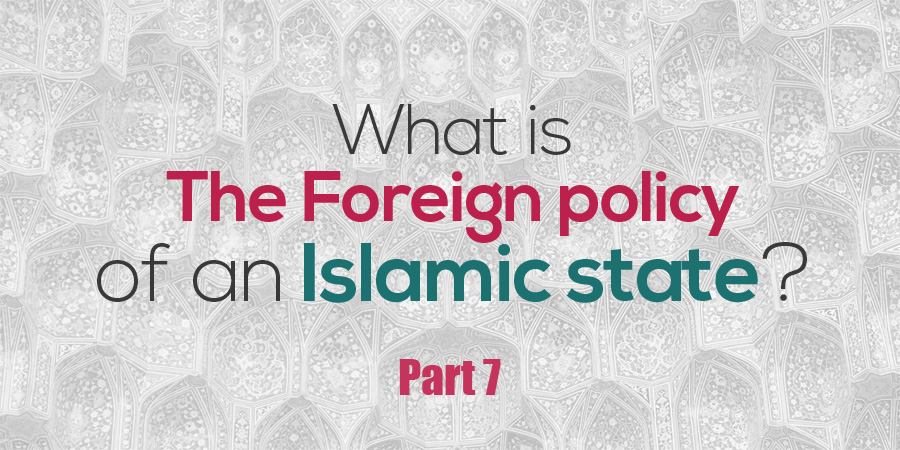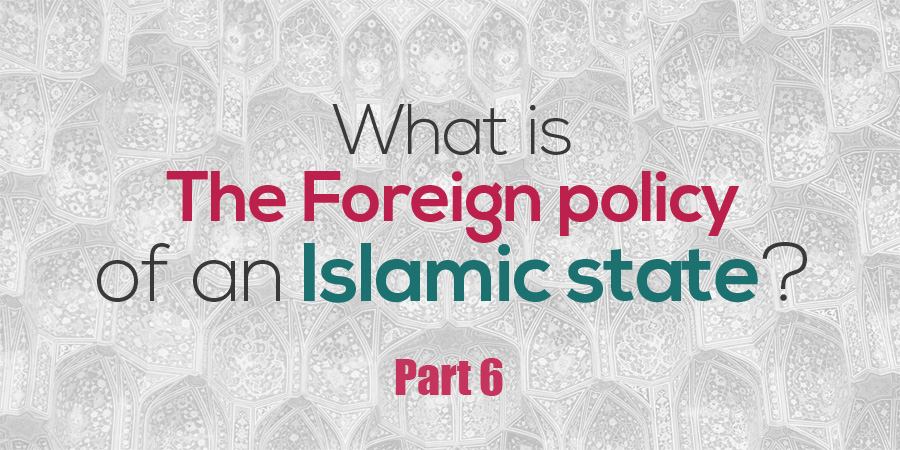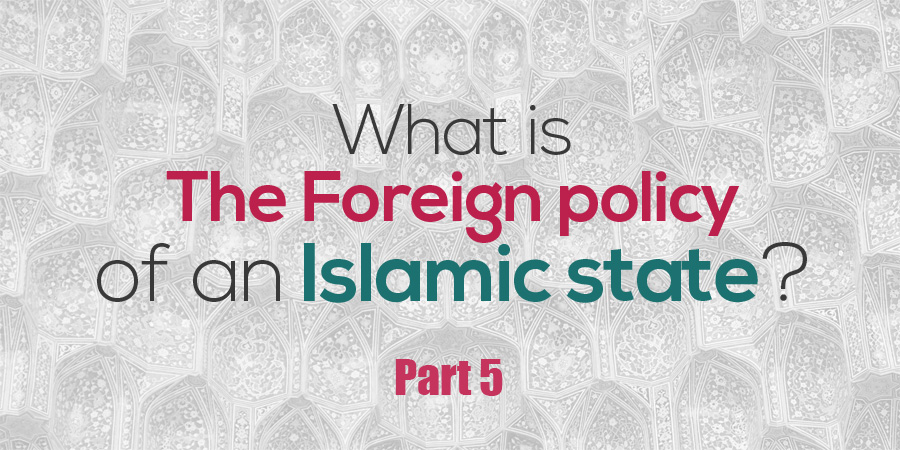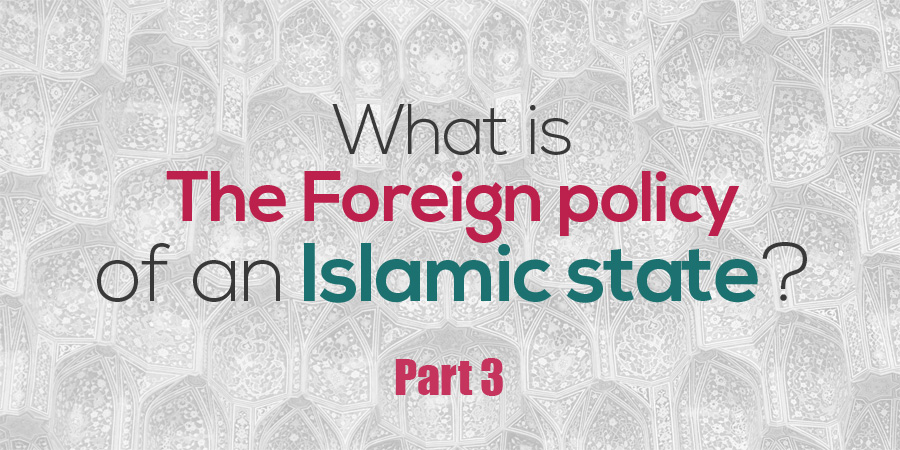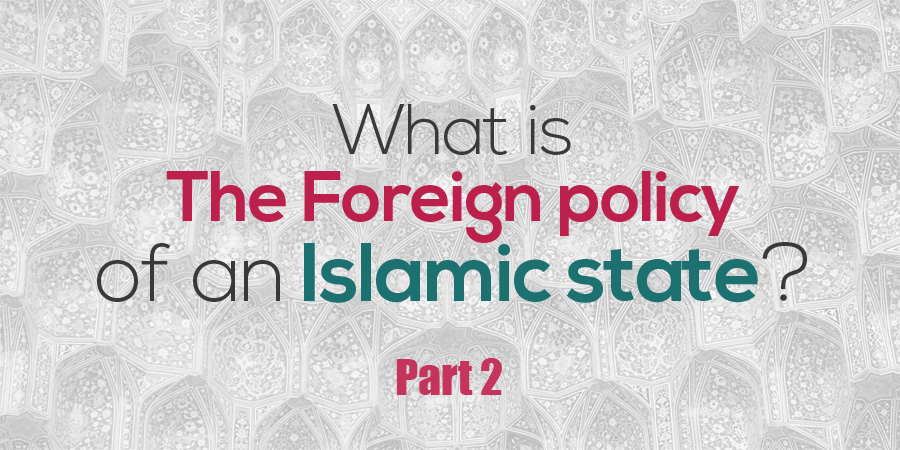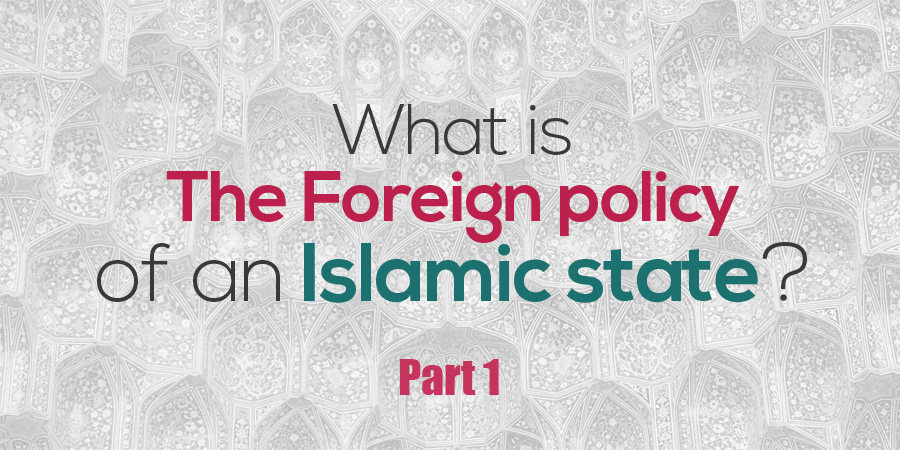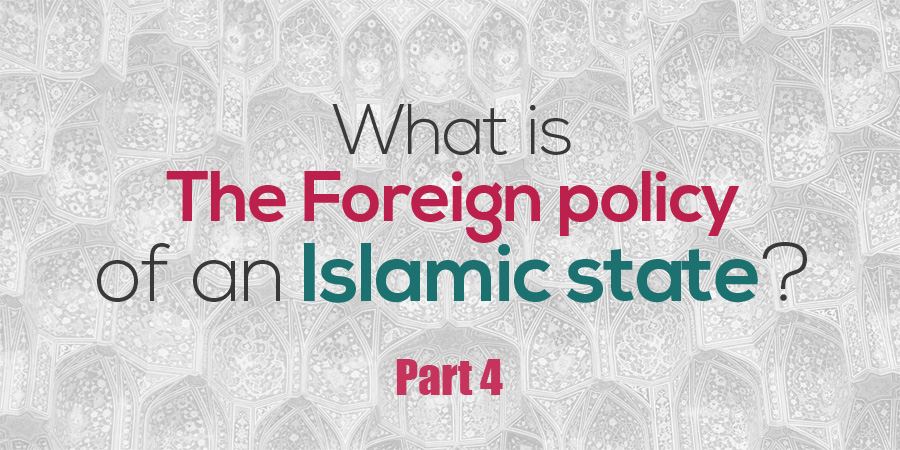 Pacts of Cooperation and Non‑aggression with Unbelievers
Pacts of Cooperation and Non‑aggression with Unbelievers
If unbelievers have no dishonest intentions of plotting and aggression against Muslims and are inclined to coexist with them in peace, an Islamic State, according to its diagnosis of the interests of Islam, can sign pacts of mutual coexistence with them. In the legitimate matters (permitted by the Shari’ah) that are beneficial for both the sides, they are permitted even to cooperate. The Qur’an says:
لَّا يَنْهَاكُمُ اللَّهُ عَنِ الَّذِينَ لَمْ يُقَاتِلُوكُمْ فِي الدِّينِ وَلَمْ يُخْرِجُوكُم مِّن دِيَارِكُمْ أَن تَبَرُّوهُمْ وَتُقْسِطُوا إِلَيْهِمْ ۚ إِنَّ اللَّهَ يُحِبُّ الْمُقْسِطِينَ إِنَّمَا يَنْهَاكُمُ اللَّهُ عَنِ الَّذِينَ قَاتَلُوكُمْ فِي الدِّينِ وَأَخْرَجُوكُم مِّن دِيَارِكُمْ وَظَاهَرُوا عَلَىٰ إِخْرَاجِكُمْ أَن تَوَلَّوْهُمْ ۚ وَمَن يَتَوَلَّهُمْ فَأُولَٰئِكَ هُمُ الظَّالِمُونَ
“Allah does not forbid you respecting those who have not made war against you on account of (your) religion, and have not driven you forth from your homes, that you show them kindness and deal with them justly; surely Allah loves the doers of justice. Allah only forbids you respecting those who made war upon you on account of (your) religion, and drove you out from your homes and backed up (others) in your expulsion, that you make friends with them; and whoever makes friends with them, these are the unjust.” (60:8‑9)
Some of the verses of the Qur’an direct Muslims to make peace with the unbelievers in case they are inclined to accept peace:
وَإِن جَنَحُوا لِلسَّلْمِ فَاجْنَحْ لَهَا وَتَوَكَّلْ عَلَى اللَّهِ ۚ إِنَّهُ هُوَ السَّمِيعُ الْعَلِيمُ
“And if they incline to peace, then incline to it and trust in Allah; Surely He is the Hearing, the Knowing.” (8:61)
The Qur’an bears witness to the concluding of the Prophet’s pacts with the unbelievers:
إِلَّا الَّذِينَ عَاهَدتُّم مِّنَ الْمُشْرِكِينَ ثُمَّ لَمْ يَنقُصُوكُمْ شَيْئًا وَلَمْ يُظَاهِرُوا عَلَيْكُمْ أَحَدًا فَأَتِمُّوا إِلَيْهِمْ عَهْدَهُمْ إِلَىٰ مُدَّتِهِمْ ۚ إِنَّ اللَّهَ يُحِبُّ الْمُتَّقِينَ
“Except those of the idolaters with whom you made an agreement, then they have rot failed in anything and have not backed up any one against you, so fulfill their agreement to the end of their term; surely Allah loves those who are God‑fearing.” (9:4)
If we refer to the history of Islam and the life of the Prophet (S), we see that during the period of his prophetic mission, he concluded treaties with the unbelievers and faithfully observed all the conditions agreed upon. A few instances may be referred to here:
- The Pact with the Jews
When the Prophet (S) migrated to al‑Madinah, he concluded a treaty between the Jews and the Emigrants (al Muhajirun) and the Supporters (al‑’Ansar), whose text has been preserved in history. Some highlights of that treaty, relevant to our discussion, are given below:
(i) Every Jew who abides by this pact would benefit from our help and friendship and there would be no discrimination between him and Muslims, and nobody would be allowed to violate his rights and befriend His enemy.
(ii) At the time of war the Jews would be required to pay their share of the expenses incurred in war.
(iii) The Jews are free to act upon their faith and Muslims upon their faith.
(iv) Anybody who declares war against any of the parties of this treaty would be fought against unitedly by both the Muslims and the Jews, and each of the allies would meet his part of the war expenditure.
(v) The Jews and Muslims declare to be committed to cooperate for the well‑being and welfare of each other, but not in the matters of sin and evil.
(vi) The signatories of this treaty would defend al‑Madinah unitedly. 1
As we see the Prophet (S) made three kinds of pacts with the unbelievers in the light of this treaty:
(1) A pact of mutual defense and sharing of the war expenditure.
(2) Freedom of the performance of religious rites.
(3) Mutual cooperation in matters of welfare and good deeds.
- The Treaty of Hudaybiyyah
The highlights of the conditions of this truce, signed by the Prophet (S) at a place called `Hudaybiyyah’, are as follows:
(i) The Muslims and the Quraysh are bound to cease all hostilities for a period of four (or ten) years, and would not attack each other.
(ii) They would respect each other’s property and would not resort to cheating or theft.
(iii) Every Muslim arriving at Mecca with the purpose of the Hajj or `Umrah, or on his way to Yemen or Ta’if would be guaranteed safe passage and security by the Quraysh, and similarly every member of the Quraysh arriving at al‑Madinah on their way to Syria or the east would be guaranteed security.
(iv) Each of the two parties are free to conclude pact with any tribe they prefer, and this pact would be respected by the other party.
(v) The Muslims and the Quraysh promise to forget all malice, enmity, and grievance against each other and would not nurture in their hearts any feeling of betrayal.
(vi) Muhammad (S) and his followers can enter Mecca to perform ceremonies of ffajj the year after, provided they do not have any kind of arms and their stay at Mecca does not exceed three days. 2
- The Treaty with Yuhanna, the Governor of Aylah
This assurance of security is made on behalf of God and His Prophet (S) in favour of Yuhanna, son of Rubah, and the residents of Aylah. God and His Prophet (S) stand surety for the safety of their persons and their ships and their caravans on voyage by land or sea. Similarly the people from Syria, Yemen and Bahrain who pass through their land are promised security. The people of Aylah are bound to pay the diyah (blood money) to the heirs of any person killed by them, and are bound not to prevent anybody from making use of the waters they take possession of, and would not prevent anybody from using the land and sea routes under their control. 3
- The Treaty with the Christians of Najran
(i) The residents of Najran are bound to pay as taxes two thousand hullah’s (certain kind of garment) to the Muslims every year in two instalments.
(ii) The emissaries of Muhammad (S) would be offered hospitality by them for one month or less, whereas the emissaries’ stay there would not exceed one month.
(iii) In case of battle in the region of Yemen, the people of Najrim, as a token of friendship and cooperation, would make available 30 coats of mail, 30 horses and 30 camels as a guaranteed loan for the Muslim army.
(iv) The people of Najran and their surrounding areas would be under the protection of God and His Prophet (S); their lives, property and places of worship would be also safe; and their bishops and priests would be free to continue performing their duties without any hindrance from anybody.
(v) No one is entitled to exile them from their land or extract tithe (`ushr) from them or launch a military attack against them.
(vi) Every person from among them who makes a legitimate claim would be treated with justice.
(vii) No person from among them would be held responsible for the crime committed by others of his faith.
(viii) The people of Najran promise to abstain from usury (ribd), otherwise Muhammad (S) would revoke terms of friendship with them and would not be bound to stick to the treaty. 4
It is evident from the Prophet’s (S) treaties with the unbelievers that the Islamic State, taking into consideration the interests of Islam and Muslims, can conclude treaties and pacts of friendship and cooperation with the unbelievers, polytheists and the People of the Book (Ahl al‑Kitab) in matters of common welfare, such as exchange in spheres of science, agriculture, industry, commerce, economy and defense.
Of course, such pacts should not pave way for the influence and interference of the unbelievers in the internal affairs of a Muslim State and should not hamper its independence and security, which is to be considered of the foremost importance at the time of concluding such pacts. In no way such pacts may be allowed to strengthen the position of the unbelievers and to endanger independence of Muslims. Islamic government in no case should ignore the hidden and inherent enmity and evil designs of the unbelievers; laxity can result in extending their influence on the Islamic State.
Written by Ibrahim Amini
References:
- Ibn Hisham, Sirat al‑Rasul, vol. II, p. 147; and Abu `Ubayd, Kitab al‑’amwal, p. 290.
- Kitab al‑amwal, p. 230; al‑Halabi, Insan al‑`uyun fi sirat al‑amin wa al‑ma’mun, vol. III, p. 24.
- 3. Kitab al‑amwal, p. 287.
- AI‑Baladhuri, Ahmad ibn Yahyi ibn Jibir, Futuh al‑buldan, p. 76; Kitab alamwal, p. 272.
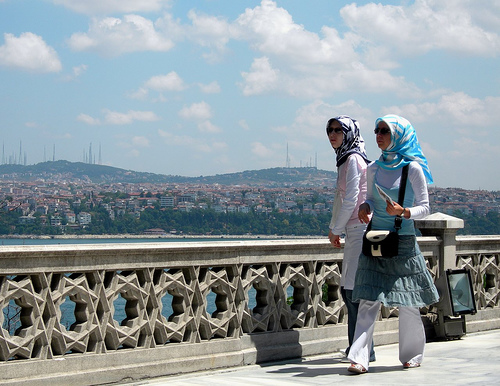 Travel is a part of everyday life. If travel is booked in advance, one can attempt to ascertain that Islam does not go out of focus during the time spent away through preparation. So, whether it is a leisure or work related visit, there are a few pointers that may help to keep Islamic ideals in focus:
Travel is a part of everyday life. If travel is booked in advance, one can attempt to ascertain that Islam does not go out of focus during the time spent away through preparation. So, whether it is a leisure or work related visit, there are a few pointers that may help to keep Islamic ideals in focus:
